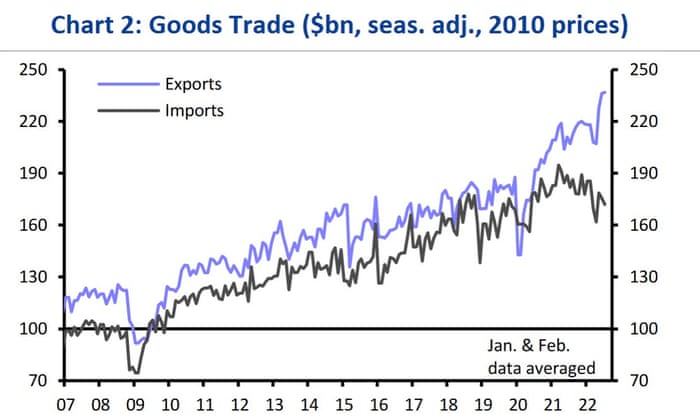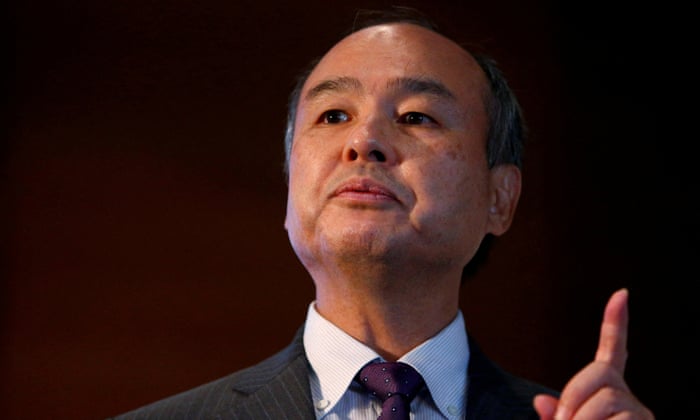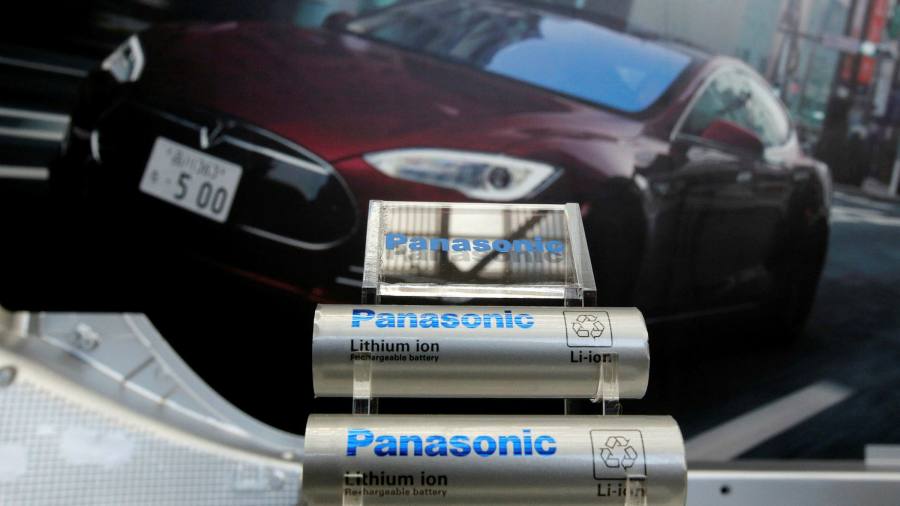[ad_1]
China exports jump but economists warn of fading prospects
Good morning, and welcome to our live, rolling coverage of business, economics and financial markets.
China has reported a record trade surplus thanks to strong export growth, but economists suggest the recovery from coronavirus pandemic lockdowns could be short-lived.
Exports from China rose 18% year-on-year in July, well above economists’ average expectations of a 14% increase.
The Chinese economy has recovered rapidly in recent months, confounding predictions of a slowdown when many of its big consumers – particularly in Europe – are already braced for a recession. Yet there has been a sugar rush from the reopening following deep lockdowns and the untangling of much of the disruption at China’s main ports, according to Julian Evans-Pritchard and Zichun Huang, economists covering the country at Capital Economics, a consultancy. That will diminish, they argued:
Exports held up well last month, thanks to a backlog of orders still being cleared. But it won’t be long before shipments drop back on cooling foreign demand. Meanwhile, imports continued to trend down, pointing to further domestic weakness.
Although the main constraints on exports recently have been on the supply-side, we think that cooling global demand will soon deflate China’s pandemic export boom.

“The momentum from the reopening rebound is fading,” wrote Craig Botham, an economist covering China at Pantheon Macroeconomics, a consultancy.
We think the data suggest export growth should wane in the second half of the year, with sources of demand fading, but policy efforts to shore up manufacturing have the effect of subsidising exports, so the process is taking longer than we initially expected. Imports, meanwhile, are unlikely to impress, but should eke out continued single digit growth. The combination should exert gradual downward pressure on the trade balance in the second half.
There are also conflicting signs from the only bigger economy in the world: the US. Economists are torn as to whether it is heading for recession shortly, or whether it will take more intense tightening of monetary policy from the Federal Reserve, the US central bank, to tip it into a contraction.
Some economists had postulated that a recession was already happening, but US jobs data on Friday suggested it is still growing fast. The data also suggest that the Fed may have to raise interest rates even more than expected in order to prevent further inflation.
Stock market futures on Monday suggested that Wall Street shares could dip when trading opens, in anticipation of tighter monetary policy.
“The US economy simply cannot be deemed to be in a recession in a month when +528k jobs have just been added as payrolls showed on Friday,” wrote Jim Reid, a strategist at Deutsche Bank.
This still feels to me like a classic (albeit compressed), old fashioned boom bust cycle. The Fed has been aggressively behind the curve with monetary policy amazingly loose versus history. The Fed have tightened a bit but monetary policy operates with a lag and monetary policy was and is still very loose.
I still think recession by around the middle of 2023 is a slam dunk and that risk assets will go well below their June 2022 lows when we’re in it, but I’m still not convinced the official recession happens over the next few months.
It probably won’t affect the short-term economic outlook, but there was also a big political story in the US overnight. The Democratic party has managed to scrape through a bill, known as the Inflation Reduction Act, that will allocate $369bn (£306bn) to reducing greenhouse gas emissions and investing in renewable energy sources. The bill passed the Senate after a compromise deal agreed between Joe Manchin, a senator who held disproportionate power because of narrow majority, and will be voted on in the House of Representatives.
The bill, which is also aimed at cutting healthcare costs, will allow the administration of US President Joe Biden to claim a victory ahead of mid-term elections in November. It will also set the US on track to cut emissions by about 40% below 2005 levels, compared to about 25% without the act, according to several thinktanks’ analyses.
Key events
Filters BETA

The UK’s accounting regulator has fined PwC £1.8m and reprimanded the firm and a partner for failures in its audit of FTSE 100 telecoms company BT.
PwC’s fine from the Financial Reporting Council (FRC) was cut from £2.5m after it quickly admitted the failure, while Richard Hughes, the partner in charge of the BT audit, will also pay a fine of £42,000, cut from £60,000.
BT found a fraud in its Italian operations in 2016, and in its 2017 financial results it was forced to make adjustments worth £513m to its previous accounts.
However, the FRC said: “the respondents did not approach the audit of BT’s treatment of the debt adjustments with the necessary professional scepticism and they failed to adequately document their audit work across the entirety of the BT Italy adjustments.”
The auditors’ breaches were not found to have been “intentional, dishonest, deliberate or reckless”, but the FRC said they were breaches of important standards.
Claudia Mortimore, the FRC’s deputy executive counsel, said:
In determining the financial impact of a major fraud detected within a business, difficult but important issues relating to appropriate accounting treatment and disclosures will need to be addressed. It is vital that these are subject to robust audit so that the users of financial statements can have confidence that the financial impact is properly and accurately stated in subsequent financial statements.
The sanctions imposed in this case, where certain elements of the adjustments following a fraud were not subject to the required level of professional scepticism, underscore this message and will serve as a timely reminder to the profession.

Shares in London-listed fashion retailer Joules have jumped by a quarter after it confirmed that it is in talks with the FTSE 100’s Next over a £15m investment.
Joules describes itself as a “contemporary country living” brand (although the Press Association previously summed it up as a “posh wellies” retailer).
The Guardian’s Mark Sweney reports:
Joules, whose share price has slumped by almost 90% over the last year, said it was in talks with Next about raising the sum in a deal that would result in the clothing and homeware retailer taking a strategic minority investment in the company.
Under the terms of the deal, Next could take a stake of about 25%, according to Sky News.
Last month, Joules hired KPMG to assist with efforts to improve “profitability, cash generation and liquidity headroom”.
Joules, which has about 130 stores and employs more than 1,000 people, also announced it was in talks to use Next’s online platform to run its digital operations. Next already sells Joules clothing through its own website.
The deal will involve the transitioning of Joules’s existing online operation, warehouse, distribution and logistics to use Next’s services, Total Platform, to run its retail websites and back-end operations.
You can read the full story here:
SoftBank suffers losses of £18bn amid tech stock rout

Japanese investor SoftBank has reported investment losses worth £18bn between April and June, as its massive bets on technology companies were hit by concerns about rising inflation and recessions.
SoftBank said its Vision Funds, two investment funds backed by Saudi Arabia, suffered losses of ¥2.9 trillion (£18bn) during the quarter.
The company, controlled by the billionaire Masayoshi Son, blamed the “global downward trend in share prices due to growing concerns over economic recession driven by inflation and rising interest rates”.
SoftBank has been hoping to list Arm, the UK-based chip designer, on the Nasdaq stock exchange, but the conditions have proven tricky for its portfolio of startups, many of which lose money and will need to raise funds via intiail public offerings.
Some of the steepest losses for its publicly listed companies were from Japanese robotics company AutoStore, US office rental business WeWork, Korean online retailer Coupang, artificial intelligence company SenseTime and food delivery company DoorDash.
It has been a fairly strong start to a Monday in August on the FTSE 100. London’s benchmark index is up 0.4% in the first 25 minutes of trade.
Leading the pack is Hargreaves Lansdown, the investment platform, up 6% following upgrades by analysts at Barclays and Deutsche Bank. Otherwise it is mostly fairly gentle gains across a broad range of sectors.
China exports jump but economists warn of fading prospects
Good morning, and welcome to our live, rolling coverage of business, economics and financial markets.
China has reported a record trade surplus thanks to strong export growth, but economists suggest the recovery from coronavirus pandemic lockdowns could be short-lived.
Exports from China rose 18% year-on-year in July, well above economists’ average expectations of a 14% increase.
The Chinese economy has recovered rapidly in recent months, confounding predictions of a slowdown when many of its big consumers – particularly in Europe – are already braced for a recession. Yet there has been a sugar rush from the reopening following deep lockdowns and the untangling of much of the disruption at China’s main ports, according to Julian Evans-Pritchard and Zichun Huang, economists covering the country at Capital Economics, a consultancy. That will diminish, they argued:
Exports held up well last month, thanks to a backlog of orders still being cleared. But it won’t be long before shipments drop back on cooling foreign demand. Meanwhile, imports continued to trend down, pointing to further domestic weakness.
Although the main constraints on exports recently have been on the supply-side, we think that cooling global demand will soon deflate China’s pandemic export boom.

“The momentum from the reopening rebound is fading,” wrote Craig Botham, an economist covering China at Pantheon Macroeconomics, a consultancy.
We think the data suggest export growth should wane in the second half of the year, with sources of demand fading, but policy efforts to shore up manufacturing have the effect of subsidising exports, so the process is taking longer than we initially expected. Imports, meanwhile, are unlikely to impress, but should eke out continued single digit growth. The combination should exert gradual downward pressure on the trade balance in the second half.
There are also conflicting signs from the only bigger economy in the world: the US. Economists are torn as to whether it is heading for recession shortly, or whether it will take more intense tightening of monetary policy from the Federal Reserve, the US central bank, to tip it into a contraction.
Some economists had postulated that a recession was already happening, but US jobs data on Friday suggested it is still growing fast. The data also suggest that the Fed may have to raise interest rates even more than expected in order to prevent further inflation.
Stock market futures on Monday suggested that Wall Street shares could dip when trading opens, in anticipation of tighter monetary policy.
“The US economy simply cannot be deemed to be in a recession in a month when +528k jobs have just been added as payrolls showed on Friday,” wrote Jim Reid, a strategist at Deutsche Bank.
This still feels to me like a classic (albeit compressed), old fashioned boom bust cycle. The Fed has been aggressively behind the curve with monetary policy amazingly loose versus history. The Fed have tightened a bit but monetary policy operates with a lag and monetary policy was and is still very loose.
I still think recession by around the middle of 2023 is a slam dunk and that risk assets will go well below their June 2022 lows when we’re in it, but I’m still not convinced the official recession happens over the next few months.
It probably won’t affect the short-term economic outlook, but there was also a big political story in the US overnight. The Democratic party has managed to scrape through a bill, known as the Inflation Reduction Act, that will allocate $369bn (£306bn) to reducing greenhouse gas emissions and investing in renewable energy sources. The bill passed the Senate after a compromise deal agreed between Joe Manchin, a senator who held disproportionate power because of narrow majority, and will be voted on in the House of Representatives.
The bill, which is also aimed at cutting healthcare costs, will allow the administration of US President Joe Biden to claim a victory ahead of mid-term elections in November. It will also set the US on track to cut emissions by about 40% below 2005 levels, compared to about 25% without the act, according to several thinktanks’ analyses.
[ad_2]
Source link


